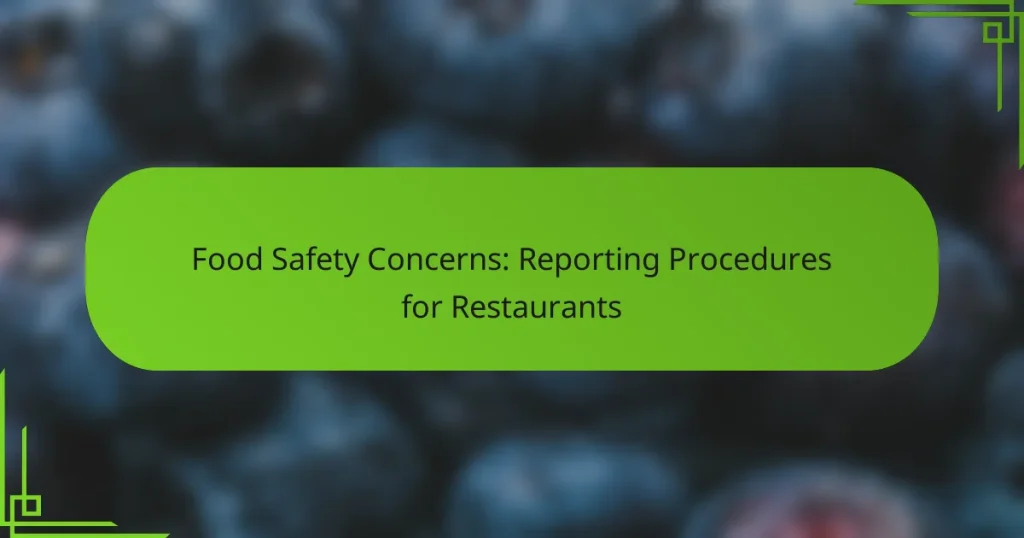Food safety is a critical concern for restaurants, requiring strict adherence to reporting procedures to protect public health. In Los Angeles, this involves immediate communication with the local health department, thorough documentation of incidents, and comprehensive staff training. By understanding and implementing these protocols, restaurants can ensure compliance with health regulations and foster a safe dining environment.
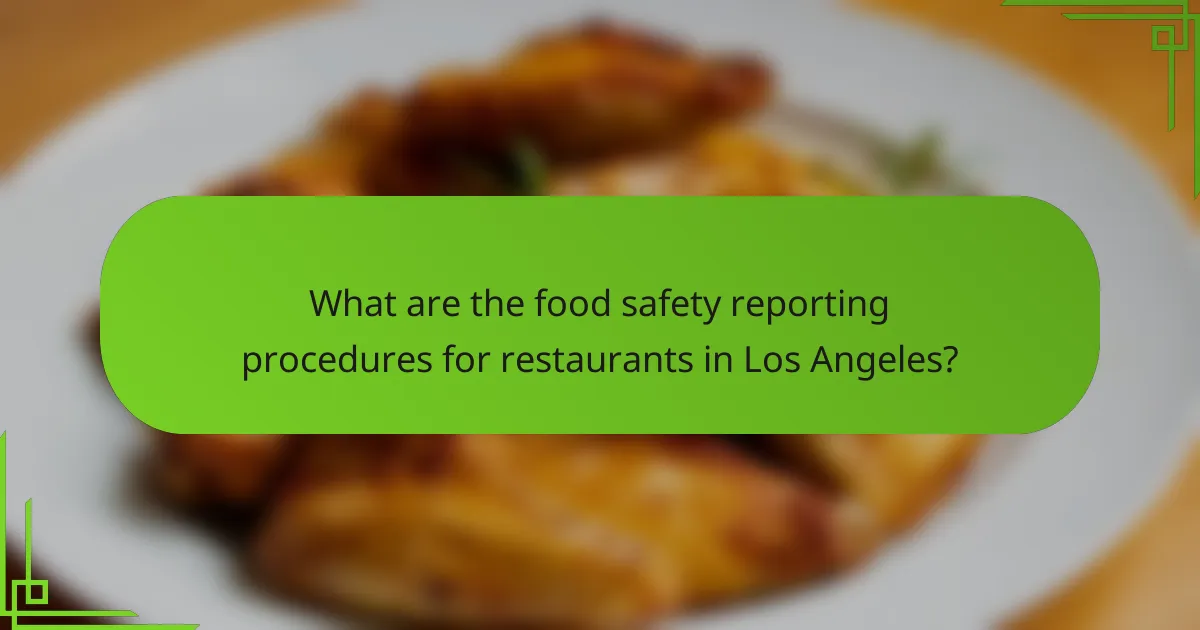
What are the food safety reporting procedures for restaurants in Los Angeles?
In Los Angeles, food safety reporting procedures for restaurants involve immediate communication with the local health department, thorough documentation of incidents, and comprehensive staff training on reporting protocols. These steps ensure compliance with health regulations and promote a safe dining environment.
Immediate reporting to local health department
Restaurants in Los Angeles must report food safety incidents, such as foodborne illnesses or unsafe food handling practices, to the local health department without delay. This reporting is crucial for public health and may involve notifying authorities within 24 hours of an incident.
Establishments should have a designated point of contact for health department communications to streamline the reporting process. Quick action can help mitigate risks and prevent further incidents.
Documentation of incidents
Accurate documentation of food safety incidents is essential for restaurants. This includes recording the nature of the incident, the time it occurred, and any actions taken in response. Keeping detailed logs helps in investigations and can protect the restaurant in case of legal issues.
Utilizing standardized forms or digital tools for documentation can enhance accuracy and efficiency. Regular reviews of these records can also identify patterns that may require proactive measures.
Training staff on reporting protocols
Training staff on food safety reporting protocols is vital for ensuring compliance and safety. Employees should be educated on recognizing potential food safety issues and the proper steps to report them. Regular training sessions can reinforce these protocols and keep staff informed of any updates.
Consider implementing a clear reporting hierarchy and providing easy access to reporting tools. Encouraging a culture of safety and transparency can empower staff to act swiftly when issues arise, ultimately protecting customers and the establishment’s reputation.
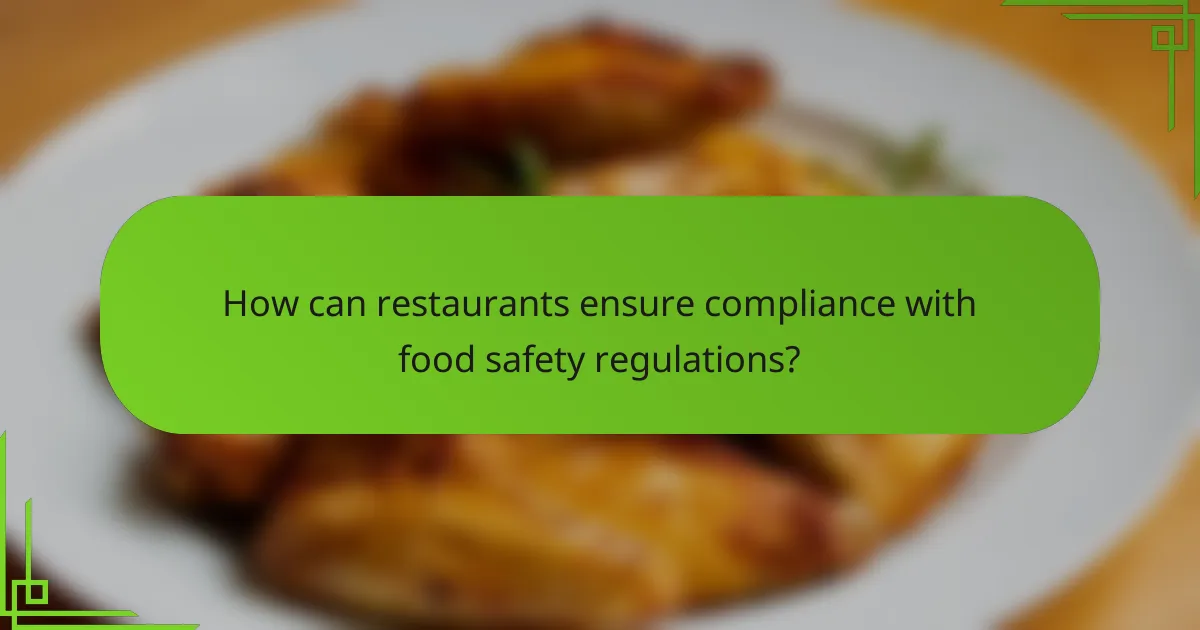
How can restaurants ensure compliance with food safety regulations?
Restaurants can ensure compliance with food safety regulations by adhering to established guidelines, conducting regular training, and maintaining a proactive approach to health standards. This involves understanding local regulations and implementing effective systems to monitor food safety practices consistently.
Regular health inspections
Regular health inspections are critical for restaurants to verify compliance with food safety regulations. These inspections, often conducted by local health departments, assess various aspects such as food storage, preparation practices, and sanitation levels.
To prepare for inspections, restaurants should maintain clean facilities, ensure proper food handling procedures, and keep accurate records of food safety practices. Scheduling routine self-inspections can help identify potential issues before official inspections occur.
Implementing food safety management systems
Implementing a food safety management system (FSMS) helps restaurants systematically manage food safety risks. An FSMS typically includes procedures for monitoring food temperatures, cleaning schedules, and employee training programs.
Restaurants can adopt the Hazard Analysis Critical Control Point (HACCP) approach, which focuses on identifying and controlling potential hazards in food production. This proactive strategy not only enhances safety but can also improve operational efficiency and customer trust.
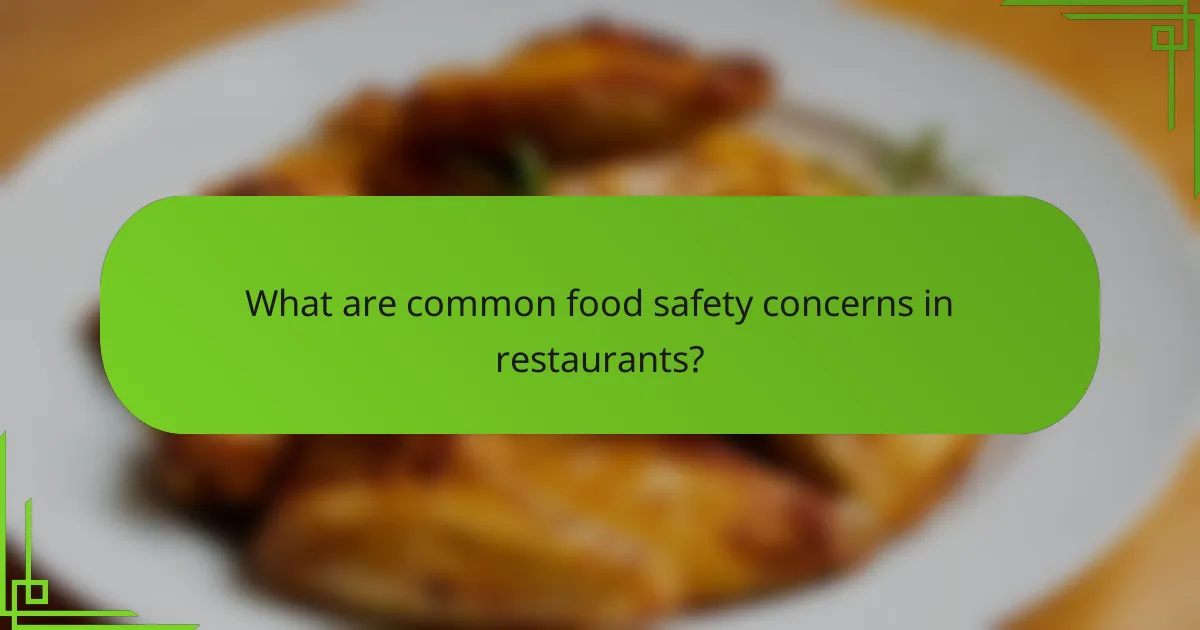
What are common food safety concerns in restaurants?
Common food safety concerns in restaurants include improper food storage, cross-contamination risks, and inadequate cooking temperatures. Addressing these issues is crucial for protecting public health and ensuring compliance with food safety regulations.
Improper food storage
Improper food storage can lead to spoilage and foodborne illnesses. It is essential to store perishable items at the correct temperatures, typically below 5°C (41°F) for refrigeration and below -18°C (0°F) for freezing. Regularly checking and maintaining these temperatures helps prevent bacterial growth.
Restaurants should implement a first-in, first-out (FIFO) system to ensure older stock is used before newer items. Labeling food with purchase dates and using clear containers can further enhance storage practices and minimize waste.
Cross-contamination risks
Cross-contamination occurs when harmful bacteria or allergens are transferred from one food item to another. This can happen through shared utensils, cutting boards, or surfaces. To mitigate these risks, restaurants should use separate equipment for raw and cooked foods.
Staff training on proper food handling techniques is vital. Establishing designated areas for raw meat and ready-to-eat items can help maintain a safe kitchen environment. Regular cleaning and sanitizing of surfaces and tools are also essential practices.
Inadequate cooking temperatures
Inadequate cooking temperatures can fail to kill harmful pathogens, leading to foodborne illnesses. It is crucial to cook foods to the recommended internal temperatures, such as 75°C (165°F) for poultry and 63°C (145°F) for whole cuts of meat.
Using a food thermometer is the best way to ensure that food reaches safe cooking temperatures. Regularly calibrating thermometers and training staff on proper cooking techniques can help maintain food safety standards in the kitchen.
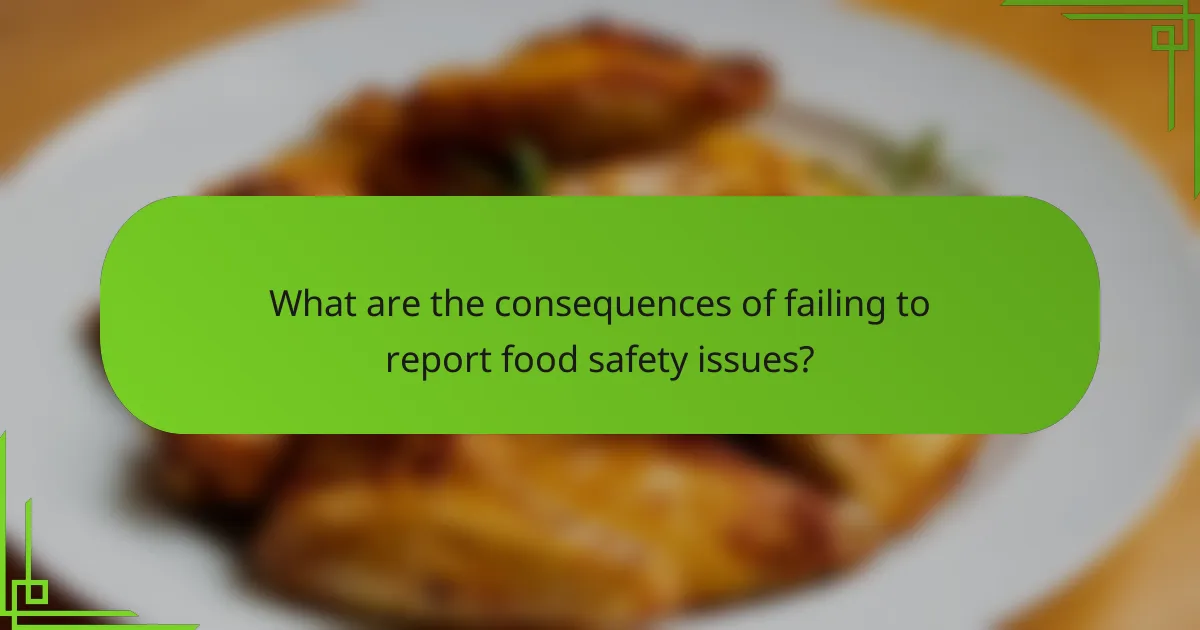
What are the consequences of failing to report food safety issues?
Failing to report food safety issues can lead to serious consequences for restaurants, including legal repercussions and damage to their reputation. Timely reporting is crucial to ensure public safety and compliance with health regulations.
Fines and penalties
Restaurants that neglect to report food safety violations may face significant fines and penalties. These can vary widely depending on the severity of the issue and local regulations, often ranging from hundreds to thousands of dollars. In some jurisdictions, repeated offenses can lead to escalating fines.
Additionally, health departments may impose penalties that include mandatory training for staff or increased frequency of inspections. It’s essential for restaurant owners to understand their local laws to avoid these financial repercussions.
Closure of establishment
In severe cases, failure to report food safety issues can result in the temporary or permanent closure of a restaurant. Health inspectors have the authority to shut down establishments that pose an immediate risk to public health, which can occur if violations are not addressed promptly.
A closure not only affects revenue but can also tarnish a restaurant’s reputation, making it difficult to regain customer trust. To prevent this, restaurant owners should establish clear reporting procedures and ensure all staff are trained to recognize and report food safety concerns immediately.

What training resources are available for restaurant staff?
Restaurant staff can access various training resources to enhance food safety practices. These resources include formal certification programs and workshops offered by local health departments, ensuring compliance with health regulations and improving overall safety standards.
ServSafe certification programs
ServSafe certification programs provide comprehensive training on food safety, covering topics such as food handling, sanitation, and allergen management. These programs are widely recognized and often required by state regulations, making them essential for restaurant staff.
Participants can choose from different levels of certification, including Manager and Food Handler certifications. The training typically involves online courses followed by an exam, with costs ranging from $15 to $200 depending on the certification level and location.
Local health department workshops
Local health departments frequently offer workshops focused on food safety practices tailored to the specific needs of restaurants in the area. These workshops are often free or low-cost, making them accessible for all staff members.
Workshops may cover essential topics such as proper food storage, temperature control, and hygiene practices. Attending these sessions can help staff stay updated on local regulations and best practices, ultimately reducing the risk of foodborne illnesses.
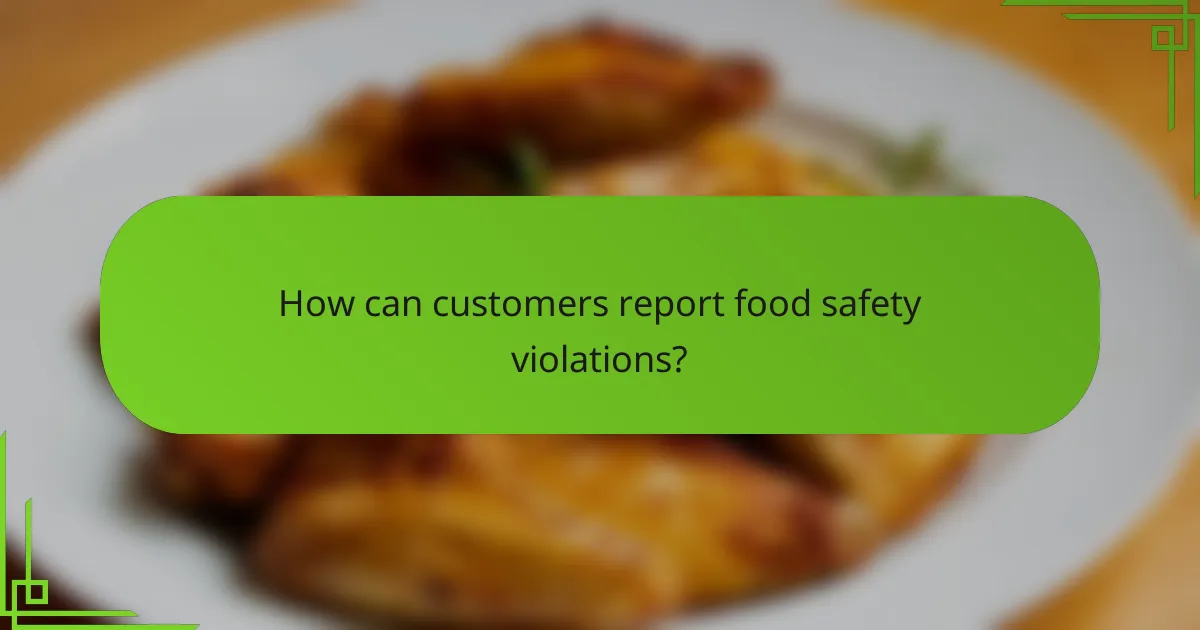
How can customers report food safety violations?
Customers can report food safety violations by contacting local health authorities or utilizing online reporting tools. These methods ensure that concerns are addressed promptly and effectively, helping to maintain public health standards.
Contacting local health authorities
To report a food safety violation, customers should first identify their local health department. This can typically be done through a quick online search or by checking the restaurant’s website for contact information. Most health departments have dedicated phone lines for reporting issues.
When contacting health authorities, provide specific details about the violation, including the restaurant’s name, location, and a description of the issue. This information helps inspectors respond effectively and can lead to timely investigations.
Using online reporting tools
Many regions offer online platforms for reporting food safety concerns. These tools often allow customers to submit complaints directly to health departments, making the process convenient and accessible. Check your local health department’s website for available online reporting options.
When using these tools, ensure to include all relevant details, such as the date of the incident and any photographic evidence if available. This enhances the credibility of the report and aids in the investigation process.
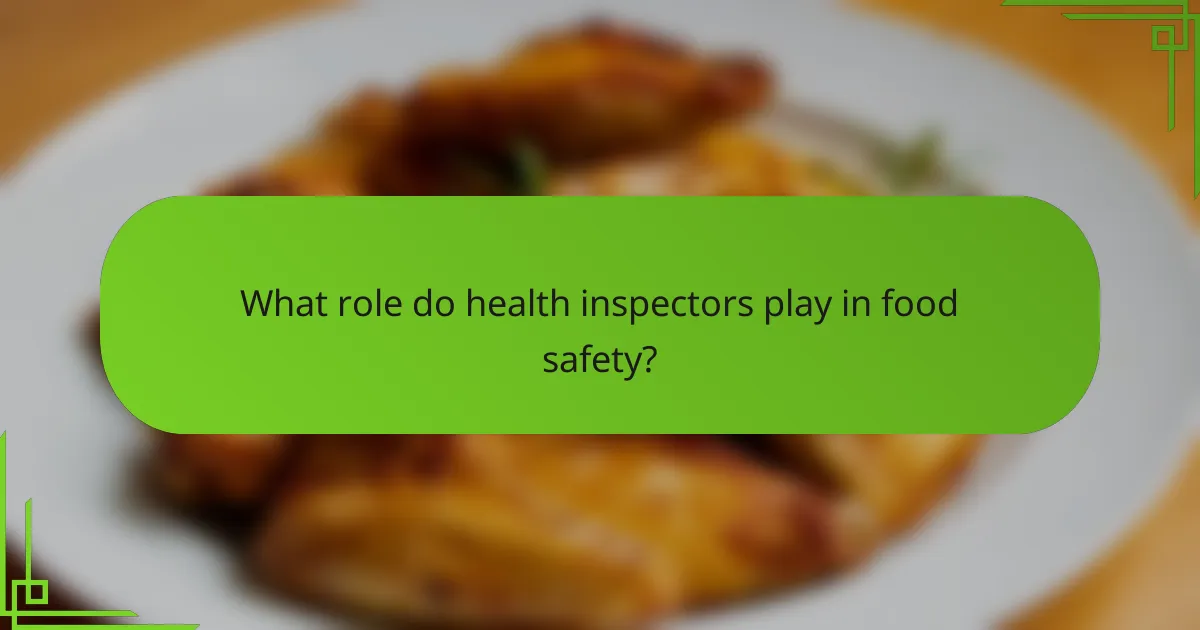
What role do health inspectors play in food safety?
Health inspectors are crucial in maintaining food safety standards in restaurants. They evaluate establishments to ensure compliance with health regulations, identifying potential hazards and ensuring safe food handling practices.
Inspection Frequency
Health inspectors typically conduct routine inspections based on local regulations, which may vary from quarterly to annually. Some areas may have more frequent checks for high-risk establishments, while others may follow a less stringent schedule.
Restaurants should be prepared for unannounced inspections, as these can occur at any time. Keeping a clean and organized kitchen can help ensure a positive outcome during these evaluations.
Common Violations
Common violations noted by health inspectors include improper food storage temperatures, cross-contamination, and inadequate employee hygiene practices. Each of these issues can pose significant risks to public health.
Restaurants should regularly review their practices to avoid these pitfalls. For instance, maintaining food at safe temperatures (below 5°C for cold items and above 60°C for hot items) is essential for preventing foodborne illnesses.
Consequences of Violations
Consequences for failing to comply with health regulations can range from fines to temporary closures. Repeat violations may lead to more severe penalties, including the revocation of a restaurant’s operating license.
To mitigate risks, restaurants should implement regular staff training on food safety practices and conduct self-audits to identify and rectify potential issues before inspections occur.
